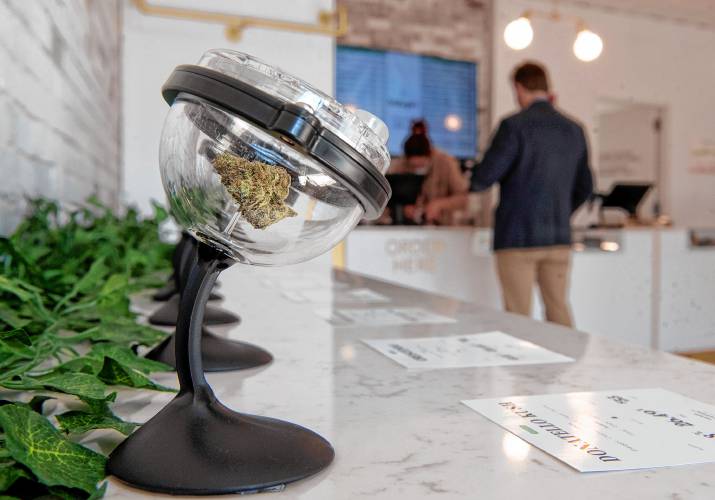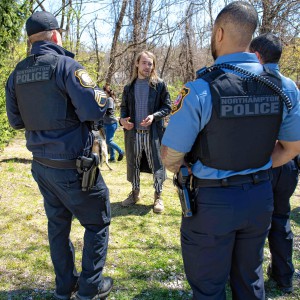Cannabis businesses sue over federal prohibition

Marijuana is displayed on the “bud bar” at Balagan Cannabis during the Northampton dispensary’s first day in 2021. GAZETTE FILE PHOTO
| Published: 10-29-2023 1:05 PM |
NORTHAMPTON — A coalition of cannabis businesses is suing the U.S. attorney general over the federal government’s prohibition of pot cultivation, manufacture, possession and distribution, saying it penalizes activities that are legal under state law.
Federal prohibition means regulated marijuana businesses in Massachusetts and other states cannot use banks or take credit card payments, and they and their employees are shut out of federal programs and may be unable to obtain mortgages.
“This is groundbreaking,” Northampton attorney Thomas Lesser said of the lawsuit. “Everyone expects it will end up with the Supreme Court.”
Lesser’s firm, Lesser, Newman, Aleo & Nasser, is assisting primary counsel Boies Schiller Flexner of New York in representing plaintiffs Gyasi Sellers, Canna Provisions and Wiseacre Farm in the lawsuit, which was filed against Attorney General Merrick Garland in U.S. District Court in Massachusetts. Sellers is the founder and CEO of Treevit, a cannabis delivery service. Canna Provisions operates two dispensaries, one in Holyoke and one in Berkshire County, and Wiseacre Farm is a Berkshire County grower.
“We want to be treated equally, on an even playing field with any other small business in Massachusetts,” Meg Sanders, CEO and co-founder of Canna Provisions, said in a statement.
A fourth plaintiff, Verano Holdings, does business in Massachusetts.
Boies Schiller principal David Boies is renowned for three major cases: leading the federal government’s successful prosecution of Microsoft in the late 1990s; his unsuccessful representation of Democratic presidential candidate Al Gore in Bush v. Gore; and for representing the plaintiff in the case that invalidated California’s ban on same-sex marriage.
The lawsuit seeks to confirm the rights of Massachusetts and other states to regulate cannabis within their borders, and to confirm corresponding limits on the federal government’s power to regulate commerce, based on Interstate Commerce Clause of the Constitution.
Article continues after...
Yesterday's Most Read Articles
 Police report details grisly crime scene in Greenfield
Police report details grisly crime scene in Greenfield
 Super defers Amherst middle school principal pick to successor; one finalist says decision is retaliation for lawsuit
Super defers Amherst middle school principal pick to successor; one finalist says decision is retaliation for lawsuit
 Homeless camp in Northampton ordered to disperse
Homeless camp in Northampton ordered to disperse
 Authorities ID victim in Greenfield slaying
Authorities ID victim in Greenfield slaying
 Haydenville residents resist Greenway trail plan, float alternative design
Haydenville residents resist Greenway trail plan, float alternative design
 Locking up carbon for good: Easthampton inventor’s CO2 removal system turns biomass into biochar
Locking up carbon for good: Easthampton inventor’s CO2 removal system turns biomass into biochar
The law at issue in the suit is the Controlled Substances Act, which bars the production, distribution and possession of marijuana regardless of whether those activities cross state lines or are conducted within the borders of a single state.
“This unjustified and unconstitutional prohibition on intrastate cannabis harms plaintiffs and hinders the efforts of states to provide patients and adults with access to strictly regulated and tested cannabis,” plaintiffs said in a statement announcing the suit.
The lawyers cite a 2005 decision upholding the Controlled Substances Act’s cannabis prohibitions, and note that circumstances have changed dramatically since then.
“Today, 38 states including Washington, D.C., have medical or adult-use cannabis programs with significant regulatory oversight,” plaintiffs state.
They assert that these regulated cannabis products can be traced back to the seeds from which they originally grew, and so are readily distinguishable from illicit interstate cannabis.
State-regulated cannabis businesses are deemed illegal under the Controlled Substances Act and their everyday activities are considered federal crimes. They are cut off from numerous federal programs and protections, including small business loans, subject to discriminatory tax penalties, and organizations such as banks and credit card processors refuse to do business with them.
“It’s a cash industry,” Lesser said. “It’s dangerous. It’s not good for anyone.”
People who work for cannabis companies can’t get mortgages and can’t get into federal housing, Lesser added.
“Their options are significantly limited,” he said.
The lawsuit calls for the Controlled Substances Act to be declared “unconstitutional as applied to the intrastate cultivation, manufacture, possession, and distribution of marijuana pursuant to state law;” and for the government to be prohibited from enforcing the law in a manner that interferes with any aspect of cannabis production or distribution under state law.
James Pentland can be reached at jpentland@gazettenet.com

 Federal probe targets UMass response to anti-Arab incidents
Federal probe targets UMass response to anti-Arab incidents William Strickland, a longtime civil rights activist, scholar and friend of Malcolm X, has died
William Strickland, a longtime civil rights activist, scholar and friend of Malcolm X, has died
